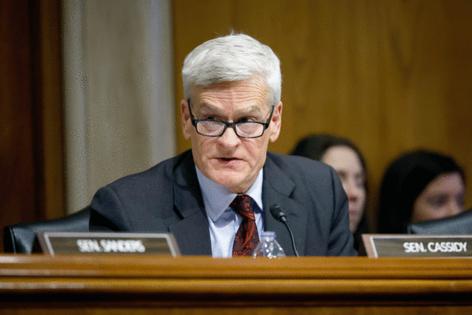UnitedHealth Group, under federal scrutiny, increases its influence in Washington
Published in Business News
WASHINGTON — UnitedHealth Group, under fire for its Medicare billing practices, is on pace to spend a record amount of money to lobby the federal government in 2025.
The nation’s largest health insurer is muscling up its lobbying as it faces a Department of Justice investigation into those practices. The company is also working to beat back congressional efforts to reduce spending on the Medicare Advantage program, which generates billions for the Eden Prairie, Minnesota-based company.
Health insurers routinely engage with Congress on sweeping legislation such as the Affordable Care Act, but the volume of UnitedHealth’s spending is noticeable since it already eclipsed what it spent on lobbying in all of 2024.
The company and its subsidiaries spent $7.67 million between January and July to lobby Congress, the White House and federal agencies such as the Centers for Medicare and Medicaid Services, according to federal lobbying reports. The spending came after President Donald Trump returned to power and Republicans gained control of Congress.
UnitedHealth deepened its lobbying bench by doubling the number of lobbyists on staff from three to six, including the addition of a former aide to Republican House Speaker Mike Johnson. The company also hired contract lobbyists with ties to key Republican powerbrokers in the Trump administration and Congress.
Earlier this summer, UnitedHealth confirmed a federal investigation into how its UnitedHealthcare subsidiary codes patients’ health conditions.
UnitedHealth officials declined to answer specific questions about lobbying practices but released a statement saying health care is facing a “pivotal” moment.
“We are committed to advancing policies that improve quality, affordability and access to care for all Americans,” UnitedHealth said. “Our educational efforts with policymakers are consistent with our mission to help people live healthier lives and make health care work better for everyone.”
But UnitedHealth was one of several insurance companies and related groups that worked to defeat legislation that could have jeopardized significant federal funding for UnitedHealth and other insurance companies that do Medicare Advantage business.
For more than a decade, critics have claimed that “upcoding” has led to billions of dollars in overpayments to insurers like UnitedHealth. The company, the largest health insurer in the Medicare Advantage system, has been criticized by government watchdogs and consumer advocacy groups for its upcoding practices.
In 2025, there’s been increasing federal scrutiny for how it operates the program.
In February, Sen. Chuck Grassley, R-Iowa, demanded information about the company’s billing practices after the Wall Street Journal reported that the U.S. Justice Department had launched a civil fraud investigation into UnitedHealth.
In March, the administrator for the Centers for Medicare and Medicaid Services, Mehmet Oz, said during his confirmation hearings that he was open to revising Medicare Advantage.
“This is just recognizing that there’s a new sheriff in town,” Oz said during the hearing. “We actually have to go after places and areas where we are not managing the American people’s money well.”
Later that month, Sens. Bill Cassidy, R-La., and Jeff Merkley, D-Ore., introduced the “No Upcode ACT,” which aimed to crack down on charting patients into categories that would give higher reimbursements under Medicare Advantage.
Congress considered including the “No Upcode Act” language in the federal budget bill passed earlier this summer but dropped it after a lobbying onslaught from the insurance industry.
“You see the power of the industry lobbying here,” said Neil Patil, senior fellow and policy director at Georgetown University’s Center on Health Insurance Reforms. “The second [health insurers] came out, a lot of folks just backed off.”
While records show that UnitedHealth has been lobbying on Medicare Advantage issues since 2011, the company paid Fierce Government Relations $180,000 to lobby on the “upcoding” legislation, which could cap insurers’ profits and the budget bill.
The company also hired a firm that employs Jane Lucas, a former aide to Senate Majority Leader John Thune and former adviser to Trump. UnitedHealth has paid lobbying firm Avoq $900,000 through the first two quarters of 2025. Another Republican lobbyist, Lindsey Seidman, was hired this spring by Avoq, to help with lobbying on “issues related to Medicare Advantage, including payments,” according to filings with the U.S. Senate.
At the root of the scrutiny for UnitedHealth, like a lot of the private health care industry, is the question of whether private companies are enriching themselves on taxpayers’ backs, said former North Dakota Democratic Congressman Earl Pomeroy, who served as his state’s insurance commissioner before serving in Congress.
“The question is, has Medicare overpaid with Medicare Advantage?” asked Pomeroy, who worked as a lobbyist for many years after leaving Congress. “We’re about to enter another open season, and we’ll have our televisions inundated with Joe Namath. You can look at the extraordinary advertising put forward by the industry [to draw in customers].”
The popularity of the program along with lobbying campaigns have made regulators and politicians reluctant to change it.
“There has been a lack of enforcement, a lack of policymaker will and insurance industry intransigence,” said David Lipschutz, co-director the Connecticut-based Center for Medicare Advocacy, a nonprofit group.
But of late, there has been an increase in regulatory pressure on Medicare Advantage plans, though not enough to rein in overpayments and access to care challenges, Lipschutz said.
In July, company officials announced they were cooperating with the federal investigation, have expressed “full confidence in its practices” related to Medicare Advantage and are “serving as reliable stewards of American tax dollars.”
The question going forward is just how aggressive Trump and the Republican Congress will be on government spending.
“Somehow when it comes to hammering a corporate interest, the velvet hand comes out, not the sledgehammer,” Pomeroy said.
(Mike Hughlett of the Minnesota Star Tribune contributed to this story.)
©2025 The Minnesota Star Tribune. Visit at startribune.com. Distributed by Tribune Content Agency, LLC.












Comments